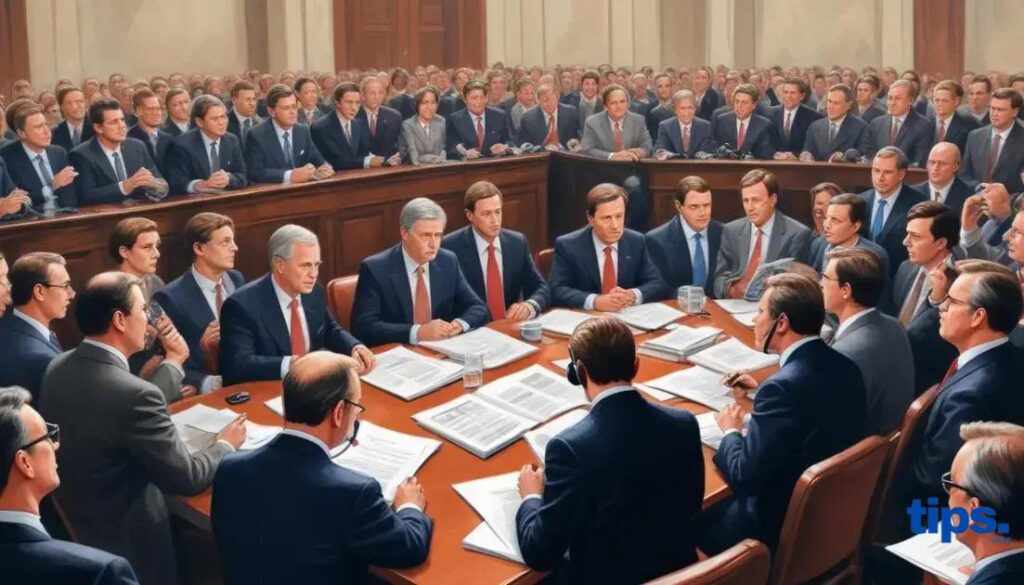Political scandals that shook the world

Anúncios
Political scandals lead to significant impacts on public trust, policy reforms, and the psychological well-being of politicians, emphasizing the need for transparency and accountability in governance.
Political scandals are more than just headlines; they often have lasting effects on our society and governance. Have you ever wondered how a single scandal can change public perception and influence elections? Let’s dive into the intricacies of these events.
Anúncios
What defines a political scandal?
A political scandal refers to any event that involves unethical behavior by politicians, potentially affecting their careers or political standing.
These scandals can arise from various actions, including corruption, bribery, or leaking sensitive information.
Characteristics of Political Scandals
Most scandals share some common traits, which include:
Anúncios
- Involvement of a public figure or politician.
- Significant public interest and media coverage.
- Potential to influence public opinion and policy.
Many scandals lead to investigations and can result in legal consequences for those involved. The ramifications can extend beyond individuals, potentially impacting entire political parties and systems.
For more information on notable political scandals, visit the Brookings Institution.
Major political scandals in history
Throughout history, several political scandals have left a significant mark on nations, reshaping public perceptions and policies. Understanding these events can shed light on the dynamics of political power.
Some of the most notable major scandals include:
- Watergate scandal: This scandal involved a break-in at the Democratic National Committee headquarters and led to President Richard Nixon’s resignation in 1974.
- Monica Lewinsky scandal: This notably impacted President Bill Clinton, involving a scandalous affair that resulted in his impeachment trial in 1998.
- Iran-Contra affair: This revealed secret dealings and led to significant controversy during Ronald Reagan’s presidency in the 1980s.
Each of these incidents had wide-ranging repercussions, leading to changes in laws, media practices, and public trust in government officials. To explore more about these events, consider visiting the official National Archives.
| Category | Summary | Example/Source |
|---|---|---|
| Definition | Scandals involve unethical acts. | Corruption, leaks, bribery |
| Famous Cases | Some scandals change history. | Watergate, Lewinsky, Iran-Contra |
| Media Role | Media exposes misconduct. | Investigations, analysis, forums |
| Public Reaction | Reactions affect approval ratings. | Protests, polls, online debate |
| Key Lessons | Transparency and trust matter. | FairVote, leadership analysis |
| Legal Impact | Often leads to investigations. | Charges, lawsuits, reforms |
| Policy Change | Scandals drive reform. | New laws, public pressure |
| Mental Health | Scandals cause stress and anxiety. | Shame, burnout, fear of failure |
The role of media in exposing scandals
The media plays a critical role in uncovering political scandals, acting as a watchdog for the public. Through investigative journalism, media outlets can reveal unethical behaviors and hold politicians accountable.
Some key ways the media contributes to exposing scandals include:
- Conducting in-depth investigations that require time and resources.
- Providing analysis and context to help the public understand the details of a scandal.
- Creating forums for public discussion and outrage, amplifying the issue at hand.
When scandals come to light, they often lead to significant political fallout, including resignations and policy changes. For more insights into the media’s role, check the Poynter Institute.
Public reaction to political scandals

The public reaction to political scandals can significantly influence the political landscape. People often respond with outrage, disappointment, or even apathy, depending on the nature of the scandal. Understanding these reactions helps in analyzing public sentiment.
Common reactions include:
- Protests and demonstrations against the officials involved, demanding accountability.
- Changes in approval ratings, as politicians may experience a sharp decline in support.
- Increased engagement in political discourse, with citizens discussing the implications on social media and other platforms.
Media coverage can also shape public reactions, amplifying feelings of anger or frustration. For an in-depth look at how public opinion shifts during scandals, you can refer to the Pew Research Center.
Lessons learned from past controversies
Each political scandal teaches valuable lessons that can guide future governance and public policy. Analyzing these lessons helps prevent similar issues from arising.
Some key lessons from past political controversies are:
- Transparency is crucial: Lack of transparency can escalate minor issues into major scandals.
- Accountability matters: Politicians must take responsibility for their actions to maintain public trust.
- Effective communication is essential: Clear communication from leaders can help mitigate backlash during crises.
Understanding these lessons encourages better practices in political conduct. For more insights, check out the FairVote organization.
Political scandals and their legal implications
Political scandals often lead to various legal implications that can affect not only the individuals involved but also the broader political system. Understanding these legal consequences is essential for grasping the full impact of a scandal.
Key legal issues arising from political scandals include:
- Investigations and prosecutions: Scandals can trigger investigations that may lead to criminal charges against involved parties.
- Regulatory changes: Many scandals prompt governments to enact new laws or modify existing regulations to prevent future occurrences.
- Civil lawsuits: Victims may file lawsuits seeking damages for wrongdoing by public officials.
The legal fallout from political scandals highlights the importance of accountability and integrity in governance. For further reading on the legal aspects, you can visit the Cornell Legal Information Institute.
How scandals shape future policies
Political scandals often act as catalysts for change, influencing how future policies are shaped. When a scandal occurs, it can expose weaknesses and prompt leaders to take action.
Key ways in which scandals shape future policies include:
- Reform initiatives: Scandals frequently lead to the introduction of reforms aimed at increasing transparency and accountability.
- Policy adjustments: Officials may adjust existing laws or regulations to prevent similar incidents from happening again.
- Public engagement: Scandals often elevate public interest in politics, leading to greater citizen involvement in advocacy and policy-making.
By analyzing past scandals, lawmakers can better understand the implications of their decisions. For more insights on political reform, refer to the Brookings Institution.
The psychological impact on politicians

The psychological impact of political scandals on politicians can be profound. These events often lead to intense stress, anxiety, and public scrutiny, affecting their mental health and decision-making abilities.
Key psychological effects include:
- Increased stress levels: Politicians may experience heightened stress due to media attention and public backlash.
- Emotional turmoil: Feelings of guilt, shame, or betrayal can emerge, particularly if they feel responsible for the scandal.
- Fear of failure: The fear of losing their position or reputation can lead to anxiety and action paralysis.
Understanding the psychological consequences is crucial for providing support to those affected. For more on mental health in politics, you can visit the MentalHealth.gov.
In summary, understanding political scandals is crucial
Political scandals impact not only the individuals involved but also public perception and policy changes. They highlight the importance of transparency, accountability, and effective communication in governance.
By examining past scandals, we learn valuable lessons that can guide future actions and reforms. The psychological impact on politicians reminds us that those in leadership positions need support during challenging times.
Ultimately, awareness and analysis of political scandals can lead to a more informed and engaged public, encouraging positive change in our political systems.





